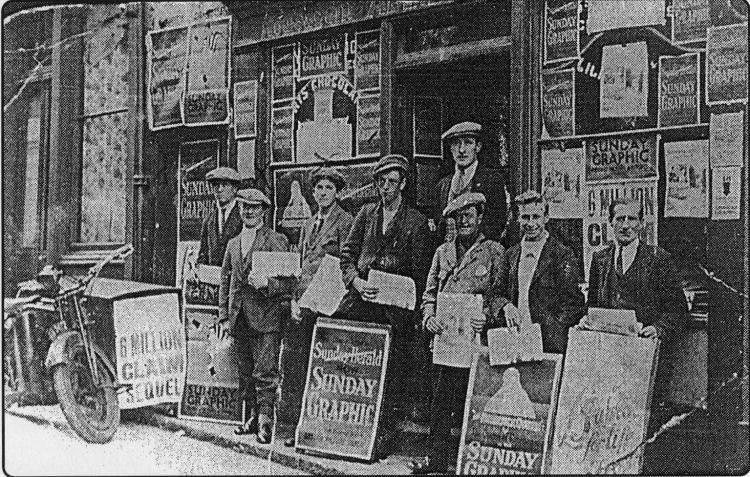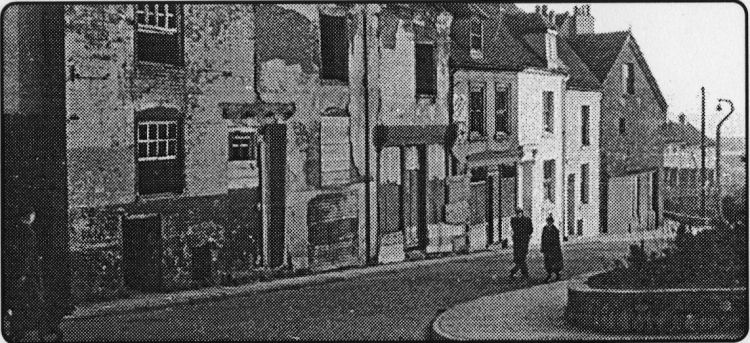
Published 16 January 2003


LOCAL historian Alan Taylor has come up with another photo of the
newsagents at 43 Dover Street (Harbour Way) following my recent Memories
piece about the fine postcard of George Parsons' former shop found by Peter
Hooper. Mr Parsons was there from 1890 until some time between 1918 and
1922. The photo below shows Abraham "Abe" Bliss, with flat cap, standing in
the doorway of his shop in the 1920s. Mr Bliss, moved from 45 Dover Street
to take over from George Parsons, the Bliss family running the shop from
1923 to November 9, 1942 (not 1944 as printed in error recently) when the
premises were hit by a shell.
Brainwave
ABOVE: Abraham Bliss stands in the doorway of his Dover Street newsagents
shop in the 1920s. The photo is from Robert Bliss who gave a copy to local
historian Alan Taylor. Alan, who also lent me the picture, left, asks if any
reader can identify the paper boys? Contact Alan on 01303 252567 or write to
him at 52 St Michael's Street, Folkestone CT20 1LP.
)
LESLIE Bradfield, 76, of Dolphins Road, Folkestone, a former Martin Walters
worker, along with his older brother Stanley, has been telling me about his
father-in-law Frank Godden's determined fight against handicap after a war
wound.
Frank, father of Lesley's wife Eileen, worked as a coalman, driving and
delivering coal in Folkestone and district for a firm called Anderson, who
operated from a yard near the top of Dover Street.
"One day, during the war years whilst his lorry was being loaded with sacks
of coal from the Gas Works, in Bradstone Road depot, several German planes
passed over the town and dropped a stick of bombs.
"One bomb landed in the coal depot and the shrapnel severed Mr Godden's left
arm, above the elbow. After a spell in hospital Frank was fitted with an
artificial arm at Roehampton. His employment as a driver and employee,
however, ceased.
‘Clem’ to the rescue
"Having lost his employment he was sent out of town to a warehouse in Deal,
sorting servicemen's uniforms, for five days a week.
"This situation for him, of working away from home, with Folkestone
receiving more air raids and shelling, put him in a depressive state," says
Les.
Unfortunately, gadgets supplied by Roehampton for his use with the
artificial arm were pretty useless, says Les — one a large hook and the
other a clumsy hand with a spring on the thumb.
"I explained this frustration to my father, Clem
Bradfield, a coachbuilder with Martin Walters. He gave the problem some
considerable thought and came up with an idea.
"From an obsolete car window fitting, he took parts to make up an appliance
which fitted to the wrist section of the false arm.
"This gave two essential movements and the fitting imitated the function of
a hand. It proved a great success and my father-in-law was able to dig his
garden and perform many other tasks, hitherto impossible for him.
"My wife Eileen was secretary to Ron Thompson, owner of a removal firm very
busy with moving people's homes away from Folkestone.
"All of his pantechnicons were on the road, with the exception of one with a
right-hand gear change.
"Knowing how much my father-in-law missed his driving job, coupled with his
desire to get his van on the road Mr Thompson gave Frank an opportunity to
practice driving the van around the firm's yard.
"Frank soon mastered the gears with his good right arm, and his years of
driving experience proved invaluable. Given permanent employment by Ron
Thompson he travelled all over England, sometimes in wartime black-out'
conditions."
And, recalls Les, Frank's success and confidence in his ability prompted him
later to purchase a car.
He asked his garage to modify it by making up an extended gear stick,
cranked to enable him to operate it with his right hand.
"Driving was a great morale booster for Frank and it gave him great pleasure
to share our holidays with him and his wife for several years, with Frank
doing the driving of course!" commented Les.
DOVER Street, east side, looking towards the port in 1957 with the former
Bliss newsagent's shop to the left of the first pedestrian.
 |
Stop squatting-and worit to improve town says edftor
1QA“3TH^ Herald warned that Folkestone >L«7\/Owas in danger of earning
such a reputation for squabbling it would become a laughing stock in
other towns. The editor called on the people of the town to sink their
differences^ take courage and be enterprising in the long^ term
interests of Folkestone. The Herald published a photograph of the
Folkestone Working Boys' Club members inside their club building opened
in 1875 by the Revd E Husband. There were 218 members, many of them
unemployeds who were looking forward to a dinner paid for from funds to
be raised at a Town Hall concert and talk about the life of Dickens,
Illustrated by '’dissolving views of local interest" early in February.
At this event it was hoped to found a local branch of "The Dickens
Federation." Not featured in the Herald was a photo of the New Year
bathers who took a dip between the Switchback Railway and the old
Victoria Pier, the sea temperature being 42 degrees and the air
temperature 40 degrees! Within a few days the district wore a mantle of
snow and there were the usual mixed feelings from local residents, some
of whom were hit by the freeze.
|
Council in last ditch bid to save St Michaels Church
M qj-q FOLKESTONE Town Council was JL570winvolved in a last minute bid
to save the 80-year-old St Michael's Church which was threatened with
demolition. Councillors thought it might be possible to find an
alternative use for the building and called on the church authorities to
think again. The church had formed the view that there was no practical
alternative to demolition. It could not afford to repair it. Alderman N.
Baker spoke of the great cost of putting up such a public building today
and said they could not: stand idly by without registering a protest.
For: one thing, it could house conferences, he suggested. A councillor
criticised the renewal of a licence for the town's last slaughterhouse
at the Bayle Steps, which he pointed out, was about a yard away from
residential property and close to a church. Cllr G Eke called on the
council's parks department to do something : about the "disgusting"
state of the flower beds and dwarf walls on The Stade, pointing out the
large sum being providing flower beds in West Terrace. In Hythe road
safety was worrying councillors, one told of the danger of lorries
overhanging narrow pavements, with the risk of hitting pedestrians,
where there was a steep camber in High Street.
|
Serious floods as the‘Woe Waters’ flow in valleys
■’’I QOQTHE 'WOE Waters' or Nailbourne, an :A«7&Ointermittent stream,
caused flooding in the rural area once again. Both homes and roads in
the Elham Valley were being invaded by a stream said to be flowing at a
rate of 20mph, after lying dormant for six months and, because the land
was already saturated by rain, there were lakes of water in many places.
The floods commenced at North Elham and a deep lake appeared opposite
the isolated farm called "World's Wonder," while at Birch's Farm, below
Deringstone Hill, floodwater flowed into one side of the farmhouse and
out the other! Homes and shops were flooded near the Barham Church
Schools, named as Perry's Stores and Quested's, butchers. A villager
called for clearing of ditches which had been neglected. At Folkestone
ceremonies were being held by two schools which underwent a change of
name. North Council School became Mundella School, and Sidney Street was
re-named George Spurgen School, Many local people were mourning the
death of sheep farmer Henry Rigden JP, one of the biggest land owners in
the area.
|
Widespread damage over area as hurricane strikes
«f "HURRICANE blasts trail of damage"
^*7 I Oread the lead story headline on the front page of the Herald 25
years ago. But it was dramatic pictures which brought home the extent of
the damage most vividly. Gusts of 75mph from Folkestone to Dungeness
shattered homes, overturned a juggernaut lorry, and buried or partly
buried 20 fishing boats under tons of shingle on the beach at
Littlestone, where conditions were described as the worst in living
memory. At Folkestone two boats were swept from moorings and trapped
underthe railway viaduct arches, trees were uprooted over a wide area
causing damage or blocking roads, a chimney stack crashed through the
roof of a home in Cherry Garden Lane, Marsh homes and roads were flooded
and powerlines cut by falling trees or other debris. Angry councillors
who opposed Council moves to nold a secret debate on the future of "Mr
Supersell," a short-contract consultant brought in to help "sell" the
resort, won their fight 12 votes to 3 - after tipping off the Herald,
whose staff lobbied individual councillors before the meeting. In the
event Leonard Piper did not get a permanent post and moved on to a job
with a London council. |
|



